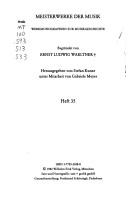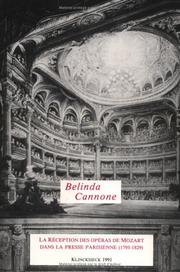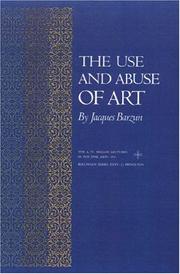| Listing 1 - 10 of 10 |
Sort by
|
Book
Year: 1949 Publisher: Bruxelles Jeunesses musicales
Abstract | Keywords | Export | Availability | Bookmark
 Loading...
Loading...Choose an application
- Reference Manager
- EndNote
- RefWorks (Direct export to RefWorks)
Book
Year: 1960 Publisher: Regensburg Bosse
Abstract | Keywords | Export | Availability | Bookmark
 Loading...
Loading...Choose an application
- Reference Manager
- EndNote
- RefWorks (Direct export to RefWorks)
Book

ISBN: 9780851628233 Year: 2013 Volume: ISMN : 979-0-060-12555-3, ISBN Publisher: London Basel Boosey & Hawkes Paul Sacher Foundation
Abstract | Keywords | Export | Availability | Bookmark
 Loading...
Loading...Choose an application
- Reference Manager
- EndNote
- RefWorks (Direct export to RefWorks)
Stravinski, Igor --- Stravinsky, Igor Fyodorovich --- Muziekgeschiedenis --- Sacre du printemps --- Stravinsky, Igor --- 20e eeuw --- Analyses
Book
Year: 2006 Publisher: Place of publication unknown Louvin
Abstract | Keywords | Export | Availability | Bookmark
 Loading...
Loading...Choose an application
- Reference Manager
- EndNote
- RefWorks (Direct export to RefWorks)
Theatrical science --- ballet --- Roméo et Juliette --- Le sacre du printemps --- hedendaagse dans --- anno 1900-1999 --- Switzerland

ISBN: 3770521080 Year: 1982 Publisher: München Fink
Abstract | Keywords | Export | Availability | Bookmark
 Loading...
Loading...Choose an application
- Reference Manager
- EndNote
- RefWorks (Direct export to RefWorks)
526.30 --- Genre- en werkbesprekingen --- Stravinsky, Igor, --- Stravinskiĭ, Igorʹ Fedorovich, --- balletmuziek (genre) --- Le sacre du printemps --- Stravinski, Igor

ISBN: 9782252028001 2908369028 2252028009 9782908369021 Year: 1990 Volume: 1 Publisher: Paris : Cicero,
Abstract | Keywords | Export | Availability | Bookmark
 Loading...
Loading...Choose an application
- Reference Manager
- EndNote
- RefWorks (Direct export to RefWorks)
Nijinsky, Waslaw, --- Roerich, Nicholas, --- Rerikh, Nikolaĭ Konstantinovich, --- Rite of spring (Choreographic work : Nijinsky) --- Sacre du Printemps --- Coupures de presse. --- Opera --- Opéra --- Mozart, Wolfgang Amadeus, --- 78.77.2 Mozart --- Nijinsky, Vaslav,
Book
ISBN: 3846764590 3770564596 Year: 2020 Publisher: Paderborn Brill | Fink
Abstract | Keywords | Export | Availability | Bookmark
 Loading...
Loading...Choose an application
- Reference Manager
- EndNote
- RefWorks (Direct export to RefWorks)
Igor' Stravinskijs Sacre du printemps gilt als Meilenstein der Musik- und Tanzgeschichte. Gleichwohl hat die Wissenschaft einen Schlüsselaspekt zum Verständnis des Werkes bislang übersehen: die ,Theaterreform um 1900'. Leila Zickgraf zeigt erstmals, dass Stravinskij mit dem Sacre sein höchst eigenes ,Theater der Zukunft' verwirklichte - gemeinsam mit dem Choreografen Vaclav Nižinskij und inspiriert von Georg Fuchs sowie Edward Gordon Craig. Durch die Rhythmen seiner Komposition versetzte er nämlich Tänzer wie Publikum in einen körperlich erfahrbaren Rausch, wodurch er die Zuschauer ins Bühnengeschehen integrierte. Die Ballets Russes nahmen damals - 1913 - eine mechanistische Ästhetik vorweg, die in Musik, Tanz und Theater merklich erst in den 1920er Jahren in Erscheinung treten sollte. Mit seiner interdisziplinären Ausrichtung zwischen Tanz-, Kultur-, Theater- und Musikwissenschaft sowie seiner umfassenden, auch russischsprachigen Quellenerschließung leistet das Buch einen wichtigen Forschungsbeitrag zu einem nicht wenig untersuchten, aber - wie sich zeigt - in zentralen Aspekten noch immer ungenügend ausgeleuchteten Meisterwerk.
Musicology. --- Music --- Musical research --- Research, Musical --- Popular music --- Research --- Historiography --- Choreografie --- Theater --- Ballett --- Tanz --- Marionette --- Hypnose --- Kontrolle --- Rausch --- Mechanik --- Alexandre Benois --- Edward Gordon Craig --- Georg Fuchs --- Primitivismus --- Ballets Russes --- Diaghilev --- Strawinsky --- Gesamtkunstwerk --- Pétrouchka --- The Rite of Spring --- Theatre Reform --- Dance --- Choreography --- Ballet --- Primitivism --- Stravinsky --- puppet --- Nijinsky --- mechanical --- Petrushka --- Theatre studies --- Stravinsky, Igor, --- Rite of spring (Choreographic work) --- Vesna svi︠a︡shchennai︠a︡ (Stravinsky, Igor) --- 1900-1999 --- Stravinskiĭ, Igorʹ Fedorovich, --- Sacre du printemps (Stravinskiĭ, Igorʹ Fedorovich) --- Rite of spring (Stravinsky, Igor) --- Sacre du printemps (Stravinsky, Igor) --- Frühlingsweihe (Stravinsky, Igor) --- Sagra della primavera (Stravinsky, Igor) --- Pictures of pagan Russia (Stravinsky, Igor) --- Frühlingsopfer (Stravinsky, Igor) --- Pictures from pagan Russia (Stravinsky, Igor) --- Tableaux de la Russie païenne (Stravinsky, Igor) --- Vesna svyashchennaya (Stravinsky, Igor) --- Scenes of pagan Russia (Stravinsky, Igor) --- Sacred spring (Stravinsky, Igor) --- Sacre du printemps (Choreographic work) --- Sagra della primavera (Choreographic work) --- Vesna svi︠a︡shchennai︠a︡ (Choreographic work)
Book
ISBN: 9782364414228 2364414229 Year: 2022 Publisher: Dijon : Éditions universitaires de Dijon,
Abstract | Keywords | Export | Availability | Bookmark
 Loading...
Loading...Choose an application
- Reference Manager
- EndNote
- RefWorks (Direct export to RefWorks)
"Œuvre composée pour le ballet, Le Sacre du printemps d'Igor Stravinski doit paradoxalement sa réputation à ses exécutions en concert et au nombre pléthorique de ses versions discographiques. Comme l'affirme David Zinman, Le Sacre est "une sorte de carte de visite" avec laquelle "les chefs d'orchestre peuvent démontrer leurs aptitudes artistiques personnelles". Aussi Le Sacre est-il l'une des pièces du compositeur les plus gravées avec plus de 180 enregistrements de la version orchestrale. Stravinski considérait ses propres enregistrements comme établissant un modèle d'exécution faisant autorité. CBS en a même fait un argument de vente en inscrivant le slogan "Stravinski dirige Stravinski" sur les pochettes de ses disques. Or ses interprétations ne respectent pas toujours le texte musical, si bien que leur valeur en tant que référence a fait l'objet de nombreux débats parmi les interprètes, les critiques et les musicologues. Cet ouvrage se propose d'apporter un regard nouveau sur la genèse, la réception et l'histoire de l'interprétation du Sacre du printemps. Plus largement, il examine la conception stravinskienne de l'exécution musicale et de l'enregistrement, et relate les liens entretenus par le compositeur avec quelques-uns de ses interprètes privilégiés."--Page 4 of cover.
Stravinsky Igor Fedorovitch (1882-1971). --- Stravinsky, Igor --- Interprétation. --- Stravinsky, Igor, 1882-1971 - Criticism and interpretation --- Stravinsky, Igor, 1882-1971. Le sacre du printemps --- Music --- Interpretation (Phrasing, dynamics, etc.) --- Stravinsky, Igor, --- Vesna svi︠a︡shchennai︠a︡ (Stravinsky, Igor) --- Vesna svi͡ashchennai͡a (Stravinsky, Igor)
Book
ISBN: 0520963156 9780520963153 9780520288089 0520288084 9780520288096 0520288092 Year: 2016 Publisher: Oakland, California
Abstract | Keywords | Export | Availability | Bookmark
 Loading...
Loading...Choose an application
- Reference Manager
- EndNote
- RefWorks (Direct export to RefWorks)
This new collection views Russian music through the Greek triad of "the Good, the True, and the Beautiful" to investigate how the idea of ";nation"; embeds itself in the public discourse about music and other arts with results at times invigorating, at times corrupting. In our divided, post-Cold War, and now post-9/11 world, Russian music, formerly a quiet corner on the margins of musicology, has become a site of noisy contention. Richard Taruskin assesses the political and cultural stakes that attach to it in the era of Pussy Riot and renewed international tensions, before turning to individual cases from the nineteenth century to the present. Much of the volume is devoted to the resolutely cosmopolitan but inveterately Russian Igor Stravinsky, one of the major forces in the music of the twentieth century and subject of particular interest to composers and music theorists all over the world. Taruskin here revisits him for the first time since the 1990s, when everything changed for Russia and its cultural products. Other essays are devoted to the cultural and social policies of the Soviet Union and their effect on the music produced there as those policies swung away from Communist internationalism to traditional Russian nationalism; to the musicians of the Russian postrevolutionary diaspora; and to the tension between the compelling artistic quality of works such as Stravinsky's Sacre du Printemps or Prokofieff's Zdravitsa and the antihumanistic or totalitarian messages they convey. Russian Music at Home and Abroad addresses these concerns in a personal and critical way, characteristically demonstrating Taruskin's authority and ability to bring living history out of the shadows.
Music --- History and criticism. --- Stravinsky, Igor, --- Stravinsky, Igor --- Stravinski, Igor --- Strawinsky, Igor --- Strawinski, Igor --- Criticism and interpretation. --- Stravinskij, Igor' Fëdorovič --- Istrāvīnskī, Īgūr, --- Stravinski, Igor, --- Stravinskiĭ, I. F. --- Stravinskiĭ, Igorʹ Fedorovich, --- Stravinskij, Igor Fiodorovič, --- Strawiński, Igor Fiodorowicz, --- Strawinskij, Igor, --- Strawinsky, I. --- Strawinsky, Igor, --- Strawinsky, Jgor, --- Стравинский, Игорь, --- סטראווינסקי, איגור --- סטראוינסקי, איגור --- 19th century russian music. --- 20th century russian music. --- contemporary russian music. --- international response to russian music. --- music history. --- music of the former soviet union. --- musicology. --- pokifieff. --- postrevolutionary russian music. --- pussy riot. --- russian composers. --- russian cultural products. --- russian music history. --- russian music. --- russian musicology. --- russian national music. --- russias antihumanistic music. --- sacre du printemps. --- stavinsky. --- zdravitsa.

ISBN: 0691018049 0691099030 0691216339 9780691099033 Year: 1995 Volume: 22 35 Publisher: Princeton, N.J. : Baltimore, Md. : Princeton University Press, Project MUSE,
Abstract | Keywords | Export | Availability | Bookmark
 Loading...
Loading...Choose an application
- Reference Manager
- EndNote
- RefWorks (Direct export to RefWorks)
The lecturer traces the historical development of attitudes toward the arts over the past 150 years, suggesting that the present is a period of cultural liquidation, nothing less than the ending of the modern age that began with the Renaissance.
Arts and religion --- Arts and society --- Arts, Modern --- Arts --- Arts and sociology --- Society and the arts --- Sociology and the arts --- Religion and the arts --- Religion --- Social aspects --- Religious aspects --- Sociology of religion --- Art --- Sociology of culture --- anno 1900-1999 --- Arts and society. --- Arts and religion. --- Arts et société --- Aspect religieux --- Arts, Modern. --- Histoire. --- Arts, Fine --- Arts, Occidental --- Arts, Western --- Fine arts --- Humanities --- Modern arts --- Abuse of Art. --- Drang nach Künsten. --- Honestly. --- Life of Beethoven. --- Mademoiselle de Maupin. --- Nietzsche. --- Paradise Lost. --- Pays du Mufle. --- Peau de chagrin. --- Poésies. --- Realpolitik. --- Sacre du Printemps. --- Stones of Venice. --- The Waste Land. --- Ubu Roi. --- View of Toledo. --- War and Peace. --- aristoi. --- art criticism. --- cultural criticism. --- detached. --- difficulties. --- grands bourgeois. --- imagine realities. --- infâme. --- insaisissable. --- naturally. --- practical. --- thrilled. --- Arts, Primitive --- Arts, Modern - 20th century
| Listing 1 - 10 of 10 |
Sort by
|

 Search
Search Feedback
Feedback About UniCat
About UniCat  Help
Help News
News